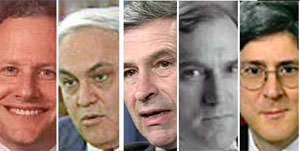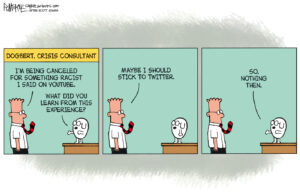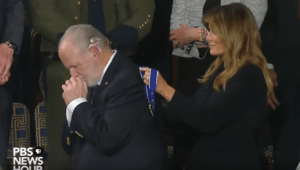With Friends Like These…
President Bush has been hemorrhaging allies recently, with Republicans upset over the loss of Congress and the neoconservative architects of the war scrambling to point fingers as Iraq spirals further and further into chaos. UPDATE: Even Henry Kissinger says Iraq can't be won militarily.
President Bush has been hemorrhaging allies recently, with Republicans upset over the loss of Congress and the neoconservative architects of the war scrambling to point fingers as Iraq spirals further and further into chaos.
UPDATE: Even Henry Kissinger says Iraq can’t be won militarily.
Your support matters…Washington Post:
The willingness to break with Bush also underscores the fact that the president spent little time courting many natural allies in Washington, according to some Republicans. GOP leaders in Congress often bristled at what they perceived to be a do-what-we-say approach by the White House. Some of those who did have more personal relationships with Bush, Cheney or Rumsfeld came to feel the sense of disappointment more acutely because they believed so strongly in the goals the president laid out for his administration.
The arc of Bush’s second term has shown that the most powerful criticism originates from the inside. The pragmatist crowd around Colin L. Powell began speaking out nearly two years ago after he was eased out as secretary of state. Powell lieutenants such as [Richard] Haass, Richard L. Armitage, Carl W. Ford Jr. and Lawrence B. Wilkerson took public the policy debates they lost on the inside. Many who worked in Iraq returned deeply upset and wrote books such as “Squandered Victory” (Larry Diamond) and “Losing Iraq” (David L. Phillips). Military and CIA officials unloaded after leaving government, culminating in the “generals’ revolt” last spring when retired flag officers called for Rumsfeld’s dismissal.
On the domestic side, Bush allies in Congress, interest groups and the conservative media broke their solidarity with the White House out of irritation over a number of issues, including federal spending, illegal immigration, the Supreme Court nomination of Harriet Miers, the response to Hurricane Katrina and the Dubai Ports World deal.
Most striking lately, though, has been the criticism from neoconservatives who provided the intellectual framework for Bush’s presidency. [Richard] Perle, [Kenneth] Adelman and others advocated a robust use of U.S. power to advance the ideals of democracy and freedom, targeting [Saddam] Hussein’s Iraq as a threat that could be turned into an opportunity.
In an interview last week, Perle said the administration’s big mistake was occupying the country rather than creating an interim Iraqi government led by a coalition of exile groups to take over after Hussein was toppled. “If I had known that the U.S. was going to essentially establish an occupation, then I’d say, ‘Let’s not do it,’ ” and instead find another way to target Hussein, Perle said. “It was a foolish thing to do.”
Perle, head of the Pentagon’s Defense Policy Board at the time of the 2003 invasion, said he still believes the invasion was justified. But he resents being called “the architect of the Iraq war,” because “my view was different from the administration’s view from the very beginning” about how to conduct it. “I am not critical now of anything about which I was not critical before,” he said. “I’ve said it more publicly.”
Independent journalism is under threat and overshadowed by heavily funded mainstream media.
You can help level the playing field. Become a member.
Your tax-deductible contribution keeps us digging beneath the headlines to give you thought-provoking, investigative reporting and analysis that unearths what's really happening- without compromise.
Give today to support our courageous, independent journalists.






You need to be a supporter to comment.
There are currently no responses to this article.
Be the first to respond.